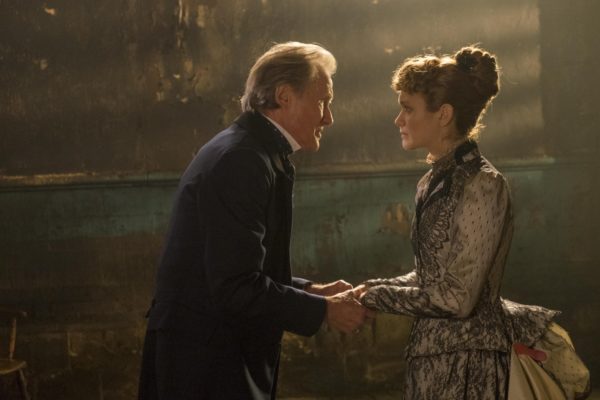The Limehouse Golem, 2017.
Directed by Juan Carlos Medina.
Starring Bill Nighy, Olivia Cooke, Douglas Booth, Eddie Marsan, Daniel Mays, and Sam Reid.
SYNOPSIS:
A series of murders has shaken the community to the point where people believe that only a legendary creature from dark times – the mythical so-called Golem – must be responsible.
Karl Marx being a suspect in a series of grizzly, oft-fetishistic murders is but a passing fancy in Juan Carlos Medina’s rollicking The Limehouse Golem. Other passing fancies include a bald, tattooed Eddie Marsan beckoning to be sexually humiliated whilst heartthrob Douglas Booth dressed to the nines, covered in makeup sings a vaudeville ditty. It’s fantastically camp and brazenly silly, a grandiose burlesque show dripping in human innards and spliced skin.
Bill Nighy is John Kildare, a veteran detective tasked with tracking and taking down the “Limehouse Golem,” a serial killer known for his grizzly murders. When the husband of famous actress Lizzie Cree (Olivia Cooke) is found poisoned, Nighy believes the deceased to be the Golem, a statement his superiors laugh off as being absurd. They instead take Lizzie in, charge her with the murder and sentence her to be hanged. All of which furthers the stakes for Kildare, who now must bring the Golem to justice whilst freeing the supposed innocent Lizzie.
Whilst in court, Lizzie tells her story: brought up by an abusive mother only to find solace in the arms of a theatrical troupe lead by Uncle (Eddie Marsan) and actor extraordinaire Dan Leno (Douglas Booth). There she meets future husband John Cree (Sam Reid).
Where the gore is garish and uncomfortable, writer Jane Goldman injects a much-needed feminist edge to the proceedings. Olivia Cooke plays Lizzie with a forthright independence; it was her who obtained a job at the theatre and her success is dependent on no man.
It’s a similar situation with Nighy’s Kildare, a character with whom his homosexuality is revealed late on in a moment quiet and carefully observed. His “sidekick” George Flood – played brilliantly by Daniel Mays – too reveals himself to be gay.
But these moments are never grandstanding; instead, Medina and Goldman play them as moments of intimacy amidst the grandiose theatricals. For a film so drenched in blood and with themes fantastically arch, it’s stuffed with moments of emotional subtlety.
Maybe subtlety is too broad. Whilst there are those moments, they are far outnumbered by the hysterically flamboyant. Douglas Booth, oft-little more than a heartthrob, is brilliant as actor Dan Leno, a camp vaudeville icon whilst Eddie Marsan, no stranger to chewing the scenery dominates every frame he’s in. The whole thing overflows in pathos and charisma.
There is certain predictability to its narrative choices and a late reveal is welcome, if not unsurprising, but these twists, the bloodied bodies and bombastic monologues, all feed into an unabashed love for Hammer Horror.
An appearance by Karl Marx as a figure of interest in the case is maybe slightly haphazard and outlandish whilst case clues are dropped with subtlety of an episode of Blues Clues.
It’s all fantastically, and aptly over the top. It’s a delicious, riveting and fantastically playful murder mystery unabashed in its nastiness.
Flickering Myth Rating – Film: ★ ★ ★ ★ / Movie: ★ ★ ★ ★
Thomas Harris















